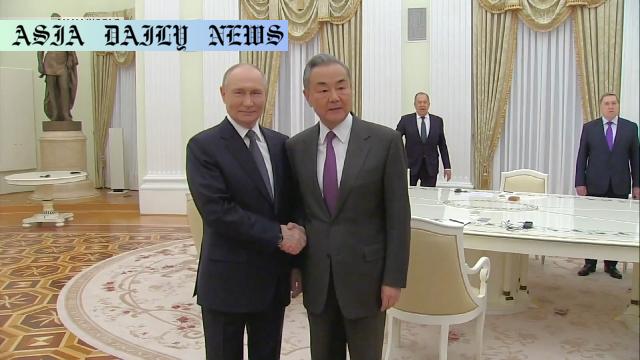Victory Day: Russian President Putin invites Chinese President Xi Jinping to May celebrations marking their World War II victory.
Putin invited Xi to the 80th-anniversary Victory Day celebration.
They aim to commemorate their allied triumph in WWII.
Russia-China ties emphasize mutual strength against US influence.
Wang Yi confirmed the success of ongoing summit preparations.

Victory Day: Honoring 80 Years of Triumph
The significance of Victory Day lies in its celebration of a pivotal moment in world history—the defeat of Nazi Germany. In a gesture underscoring the deep-rooted camaraderie between Russia and China, Russian President Vladimir Putin officially extended an invitation to Chinese President Xi Jinping to attend the upcoming festivities on May 9. The grand occasion, marking the 80th anniversary of the Soviet Union’s victory in World War II, highlights not only historical milestones but also modern-day alliances.
World War II reshaped geopolitics and international relations as we know them, and the former Soviet Union’s formidable role in achieving victory continues to be a source of both pride and reflection for Russia. This year, with a large-scale celebration planned, Putin’s emphasis on Chinese participation signifies a deepening bond between the two nations. According to Putin, the event will serve as an opportunity to also commemorate the defeat of militaristic Japan, marking an important chapter in China’s own historical narrative. The synergy reflects a partnership crafted around shared historical struggles and enduring collaboration in the present geopolitical framework.
Russia-China Relations: Bolstering Alliances Amid Global Challenges
In his meetings with Chinese Foreign Minister Wang Yi, Putin reaffirmed the shared commitment to advancing this strategic partnership. This camaraderie is essential for countering challenges such as international sanctions and balancing against external pressures, including influences from the United States. Wang Yi’s statements during his Moscow visit reveal steadfast optimism for deepening ties between Beijing and Moscow. Stressing that bilateral cooperation is not aimed against any “third party,” Wang also implied that these alliances could serve as a stabilizing factor amidst geopolitical turmoil.
The trajectory of these two global powers’ cooperation appears fortified in the face of economic and political challenges. With preparations for Xi’s visit underway, this manifestation of unity reaffirms the intent to resist external impediments while nurturing diplomatic relationships rooted in mutual respect and shared objectives. For world observers, the visible solidarity between the two powers brings both reassurance and uncertainty. Will these alliances open doors to a multipolar global order, or simply intensify global competition?
Victory Day: A Contemporary Lens
While rooted in the past, the significance of Victory Day resonates strongly in today’s global context. The ongoing commemoration suggests not just a remembrance of historical victories but also a statement of intent. The celebration this year assumes added importance as it will be seen through the lens of current geopolitics. The emphasis on a shared victory over “militaristic Japan” is especially critical, unveiling reflections on history, while underpinning the nations’ message of unity.
The event stands as an emblem of historical endurance and collective power, creating a diplomatic stage where traditional alliances serve today’s geopolitical strategy. Victory Day, thus, seamlessly blends the remembrance of the past with strategic partnerships geared towards a shared future. The message is clear: long-standing friendships are adaptable and have the capacity to maneuver through modern challenges.



Commentary
Reflecting on Victory Day and Russo-Chinese Ties
Victory Day serves as an eternal symbol of sacrifice, unity, and triumph in one of humanity’s greatest conflicts: World War II. With its roots deeply embedded in historical pride, this commemoration also allows us to see how nations repurpose their shared past to strengthen contemporary alliances. For Russia, the invitation extended to China’s President Xi Jinping comes as no surprise. The two nations have for years worked on cultivating ties that not only benefit them economically but also provide a united front against an increasingly tense global scenario dominated by Western influence.
In recent years, both Russia and China have faced their challenges on the global stage. Accusations of human rights violations, heightened scrutiny over geopolitical contests, and the shadow of economic sanctions have given these two powers ample reason to look to each other. Sharing a history of collaboration during World War II, Russia and China find Victory Day an ideal backdrop to send a quiet, yet powerful, message about their mutual support and combined strength.
Commemorating Victory While Building a Narrative
Viewing the planned celebrations also through a political lens, one can discern a clear message from Putin and Xi—mutual respect laid in history sustains relevance amid modern geopolitics. Victory Day is no longer just about celebrating past glories; it speaks directly to present realities. Events like these give world leaders—and their nations—a platform to recalibrate alliances, invite dialogue, and showcase messages of power and resilience.
Ultimately, the true importance of Victory Day in today’s political climate lies in its ability to retain historical authenticity while evolving to address contemporary diplomatic needs. The growing interconnectedness of nations like Russia and China reflects how history continues to play an instrumental role in shaping geopolitical reality. For the global audience, these celebrations are not only a moment to remember but also an opportunity to view a reshaping world order in the making.